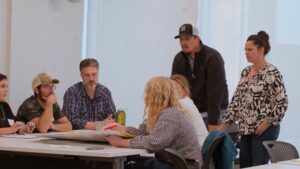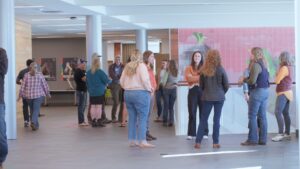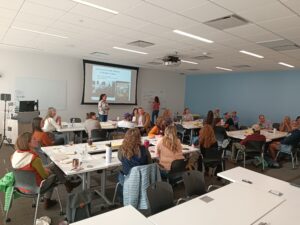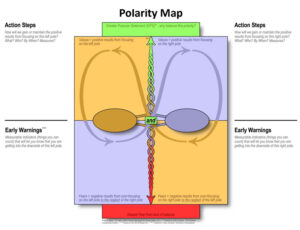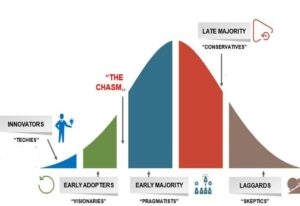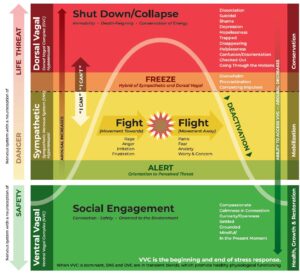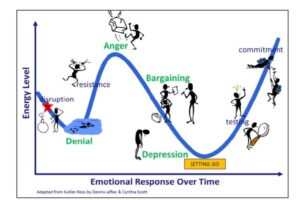Final report for WPDP23-015
Project Information
Through a lens of soil health, Skills and Tools for Complex Adaptive Thinking to Equip Leaders in Change Initiatives will expand agricultural professionals’ skillsets in being trusted coaches and resources for farmers and ranchers. These skills are invaluable in the analysis and discernment of scientific information, practices and cultural knowledge—as well as supporting producers’ innate wisdom and ingenuity—to weave through complex issues and conversations, partner with producers in context-based solutions and reveal creative paths forward in polarizing situations. Mark Shrock, a Kansas-based no-till farmer since 1998, describes his journey to creating a soil-centric farm as “more of a thought process in problem-solving than knowing the right answer right now....thinking about biological systems and plants, sun, water and nutrition”1. Often, the best-intentioned farmer or rancher adopts new technology or quick fixes that carry hidden consequences to the farm system, diminishing profitability, soil, plant or animal health and/or social well-being.
Based on the premise that a producer’s mindset, mental models and assumptions can limit or expand their full potential and success, this project offers agricultural educators new tools and coaching frameworks to learn, self-reflect, see “wholes”, avoid unintended degenerative consequences and embrace adaptive-thinking and experimentation. This program fills a critical void in professional development for ag providers and will ultimately lead to positive change through increasing resilience, profitability and well-being in the face of rising input costs, drought, severe weather, declining soil health and mental wellness concerns.
Integrity Soils and the project team will adapt business and ecological frameworks from organizational learning, biomimicry and polarity mapping—along with new discoveries in cognitive and neuroscience on the biology of learning—to design and deliver in-person and online training curricula for at least 160 agricultural professionals throughout the West.
For this proposal, objectives and short term learning outcomes are the same. Please reference the attached Logic Model for additional detail.
|
Logic Model reference # |
Objectives |
Indicator |
Target Number |
How Measured |
|
4.1 |
Increase ag providers skills, tools, frameworks and practice to shift mindset/mental models and embrace adaptive thinking and experimentation |
# of ag providers with increased skills, tools, frameworks and practice to shift mindset and embrace adaptive thinking and experimentation |
160 |
End of course survey |
|
4.2 |
Increase ag providers knowledge of and practice with polarity management, organizational learning and biomimicry principles and frameworks |
# of ag providers with increased knowledge of and practice with polarity management, organizational learning and biomimicry principles and frameworks |
160 |
End of course survey |
|
4.3 |
Increase ag providers skills, tools, frameworks and practice with self-assessment of change programs |
# of ag providers that increase skills, tools, frameworks and practice with self-assessment of change programs |
160 |
End of course survey |
|
4.4 |
Increase ag provider understanding of cognitive psychology and neuroscience as they relate to decision-making and pathways to learning in agricultural contexts |
# of ag provider participants that increase understanding of cognitive science as it relates to decision-making and pathways to learning |
160 |
End of course survey |
|
4.5 |
Increase ag providers skills, tools and practice with frameworks that build trust with farmers and ranchers |
# of ag providers that increase skills, tools and frameworks to build trust with farmers and ranchers |
160 |
End of course survey |
|
4.6 |
Deepen ag providers’ conflict resolution skills |
# of ag provider that increase conflict resolution skills |
160 |
End of course survey |
|
YEAR |
TIMELINE |
MILESTONE |
PARTICIPANTS |
OUTPUTS |
OBJECTIVES/OUTCOMES |
|
2023 |
April-August |
Curriculum Development |
PIs, Cooperators |
The Playbook: self-assessment tool, curriculum and activities, power-points, workshop agenda |
|
|
2023 |
September |
2-Day in-person beta workshop |
PIs, Cooperators, Participants |
See Logic Model Objectives/Outcomes 4.1-4.6 |
|
|
2023 |
September |
Evaluate workshop feedback |
Evaluator, PIs, Cooperators |
Formative Evaluation Data |
Improved curriculum and activities |
|
2023 |
September-October |
Video filming |
Videographer, PIs |
Raw graphic content for online course |
|
|
2023/2024 |
October-January |
Post-production videography |
Videographer, PIs |
High-quality edited, mastered visual content |
|
|
2023/2024 |
October -January |
Market online school |
PIs, Cooperators |
Participants recruited |
|
|
2023/2024 |
December-January |
Thinkific Platform management, load curriculum/content |
Administrator, PIs |
Online course |
|
|
2024 |
January |
Introductory live webinar |
PIs, Cooperators |
Course description, participant introductions. Class hubs |
Understanding of course expectations, curriculum, methodology, platform. Q&A. |
|
2024 |
January |
Annual Report submitted |
PIs, Evaluator |
Report |
Project update |
|
2024 2025 |
January-March |
Online course #1 Marketing for online course #2 |
PIs, Participants |
Training Participant recruitment |
See Objectives 4.1-4.6 |
|
2024 |
March |
Concluding live webinar Post course evaluation |
PIs, Evaluator, Cooperators |
Course wrap up, discussion, evaluation data |
Understand course impact, feedback for course #2 |
|
2024 |
April-June |
Online Course #2 and evaluation Marketing for online course #3 |
PIs, Participants, Evaluator |
Training Participant recruitment |
See Objectives 4.1-4.7 |
|
2024 2025 |
October-December |
Online Course #3 and evaluation |
PI, co-PI, Participants, evaluator |
See Objectives 4.1-4.7. Understand course impact |
|
|
2024/2025 |
September - January |
Intermediate and end-of-program surveys and interviews |
Evaluator, Participants, PIs, |
Program evaluation data |
Assess intermediate actions and conditions: 5.1-5.6; 6.1-6.7. See Outcomes below or Logic Model. |
|
2025 |
January-March |
Data input, analysis, evaluation and reporting Final Report |
Evaluator, PI, co-PI, Cooperators |
Assembled and analyzed data Final Report |
Understanding course effectiveness, pitfalls, etc |
Cooperators
- - Producer
- (Educator)
- - Producer (Educator)
Education
Our methods call upon teachings from Socratic questioning, constructivist, social and critical epistemologies. Integrity Soils calls upon a diverse range of teaching methodologies, lecture-based learning, group learning, one-on-one pairing, listening skills and techniques to foster better questioning. This approach supports learning from within as students are supported in creating solutions and answers to issues and course materials.
Activities used included:
- Mindful awareness exercise
- Reflective practices and group discussions
- Self-reflection
- Case study enactments that bring a case study to life through an interactive scenario. This approach allows students to step into the shoes of key stakeholders, apply theoretical knowledge to practical situations, and engage in critical analysis and decision-making.
- Journaling
Experiential somatic learning
- Use movements and visualizations to integrate body, mind, and emotions
- Group discussions to reflect where their client's experiences are arising from.
Kinesthetic learning
- Drawing with colored pens
- Role-playing activities to embody teaching concepts
- Delivering a student-designed skit
Lecture-based learning
- Powerpoints, videos, whiteboard, flipcharts and webinars
Images from in person Denver workshop. Photo credits: Jeremy Masters
Education & Outreach Initiatives
Ag Providers increased skills, tools and frameworks to support producers in being more open to experimentation and adaptive thinking. Feedback is being incorporated to refine curriculum for online curricula.
Program PIs and partners developed the Shifting How Influencers Facilitate Transformation (SHIFT) training curriculum and offered the following:
- 2-day SHIFT curriculum in Denver to 36 ag providers and producers. The interactive workshop was filmed to create video content for the online course. Multiple break-out groups tackled several exercises to practice and integrate lecture material. Participants reported back to the whole group.
- 2 online webinar courses with introductory and closing live sessions as well as off-line cohort work groups
- In-person follow up SHIFT course with Intertribal Agriculture Council (IAC) ag professionals in Livingston, MT.
- On-going online self-directed course. See here
- Completed downloadable Playbook for students (see educational materials at end of report)
Curriculum topics
- What is Leadership?
- Nature’s Principles of Leadership
- Models of Learning
- Neuroscience of Change
- Listening Skills
- Designing Programs for Transformation
- Patterns and Habits
- Ecology of Money
- Polarization Mapping
Curriculum and activities
Chapter 1: Introduction
- Introductions
- Wicked Problems
- Uncertainty
- Journaling
Chapter 2: Adult Learning
- Human Learning
- Transformative Learning Theory
- Educational Contexts: Coach, Mentor, Expert
- Journaling
Chapter 3: Behavioral Change
- Coaching
- Behavior Change
- Crossing The Chasm
- Non-Verbal Communication
- Who Am I Being - worksheet
- Peak Moment - worksheet
- Questioning to open doorways - worksheet
Chapter 4: Polyvagal Theory
- Polyvagal Theory A and B
- Early Warning Signs - worksheet
- Who made a difference in your life?
- Parasympathetic - what do you love?
- Strategies for Regulation
Chapter 5: Polarity Mapping
- Polarity Map
- Identify Polarities
- Loosening our attachments
- Do a Polarity Map
Chapter 6: Designing Programs for Change
- Introducing Switch
- Chose project
- The Elephant and the Rider
- Shape the path
- Project Design
We conducted a retrospective Post-then-Pre survey design to assess participants' levels of growth in the different objectives. This methodology specifically waits until after the training to ask students to evaluate their level change in knowledge, awareness, skills and confidence before the course as oftentimes we overestimate our knowledge base before being exposed to new materials. Out of a total of 124 students, 50 completed surveys.
Participants were asked to rate their understanding/ability/confidence on a scale of 1 to 5, where 1= NONE and 5 = MOST. Responses were averaged for the following outcome.
| n=50 | Pre-Training | Post-Training | Increase |
| My ability/confidence to coach producers through decision-making, adaptive thinking and experimentation | 2.6 | 4.00 | 1.4 |
Ag providers increased knowledge of and practice with polarizing issues and increased knowledge of styles of learning.
PIs described Peter Schulte's polarity management theory, framework and polarity map. Polarity management focuses on recognizing and balancing two poles of an issue or situation, with the realization that neither pole is right or wrong and that there is wisdom in diverging perspectives on an issue. Common examples of pairs of polarities include: structure AND flexibility, leading AND empowering, advocating AND being curious. Participants broke into small groups and practiced polarity mapping on contentious topics.
Participants were asked to rate their understanding/ability/confidence on a scale of 1 to 5, where 1= NONE and 5 = MOST. Responses were averaged for the following outcomes. Additionally, 17 out of 50 participants noted that polarity management was one of the most effective activities/topics they learned to work with producers to promote lasting change and 19 of 50 participants indicated they will put this framework into action.
| n=50 | Pre-Training | Post-Training | Increase |
| My understanding of polarity management and tools to work with producers in polarizing situations | 1.81 | 3.53 | 1.72 |
| My ability/confidence in working with producers in polarizing situations | 2.38 | 3.79 | 1.41 |
Responses from participants included:
"The polarity exercise taught me how to reposition my thinking on contentious topics and be a more effectual communicator when I may not agree wit someone on a topic."
"I learned that I rarely operate below “orange” on the poly-vagal scale. I am certain I’ll be able to help my clients deactivate in the future and even build situations geared towards de-activation."
Ag providers increased skills, tools, frameworks and practice with self-assessment and change/transformation programs.
Numerous topics and activities addressed how we work with ourselves and producers to achieve positive change in their lives and on their farms. Working with producers to recognize how patterns and states of being can limit or expand options and possibilities can have a powerful impact on coaching them into change. Ag providers will be more effective in this arena when they recognize their own ways of being.
PIs began with styles of learning and teaching and the learning spiral which describes a progression through five stages of learning. 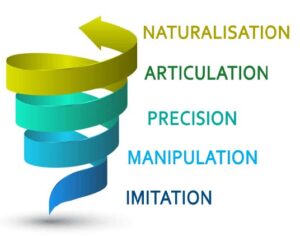
- Naturalization – skills become automatic with limited thought or exertion.
- Articulation – harmony and consistency used to combine 2 or more skills in one major skill sequence
- Precision- Reproduces a skill with accuracy and proportion. Generally an exact performance from the original source.
- Manipulation –performs in accordance to instructions, rather than observation
- Imitation – see skills and tries to repeat
The Parable of the Boiled Frog was introduced to spur thought on the danger of being unaware of deteriorating conditions until it is too late. Consideration was given to how folks are charmed by new technology and quick fixes. Ultimately, learning is doing and knowledge is experience, but if we are unaware of the consequences of our actions we can not learn from direct experience.
Educational contexts/teaching styles were presented to bring light to working alongside producers to learn and observe as opposed as being an authority figure presenting information.
Designing programs for transformation (shifting how we observe, think and act) began by looking at the trajectory of change initiatives, and, in particular, how do we move past early adoption across the chasm to a majority of adopters? The importance of engaging thought leaders respected in their communities to be champions of change was emphasized.
PIs presented on how important our listening skills are, especially to quiet our own minds, observe, limit our inclination to speak too much and have a big heart to give and receive — people want to know you care before they care what you know. Participants practiced observing and listening.
Producers generally are experiential learners and approaches relying only on analytical come at the cost of empathy, self-expression, creativity, emotions and spiritual connections. Participants reflected on their ability to create trusted space for producers to share emotionally and what their automatic responses are.
One of the most well-received topics was The Rider and The Elephant, where the rational side of the brain is the rider and the elephant represents the emotional side of the brain. The rider's strength is to think and plan, the elephant's strength is emotion, without which we lack motivation/energy to get things done. Shifting behavior requires that we: 1) direct the rider, 2) motivate the elephant and 3) shape the path. PIs presented on strategies to achieve this and participants practiced working scenarios in small groups.
Participants were presented with the following set of questions to self-reflect on how they showed up as a leader.
Where did you find yourself coaching-bringing out the full self-expression for those around you.?
- When did you lead from behind and bring out others’ shining light?
- When did you feel compelled to…drive your own agenda or jump in? Give advice?
- Did you interact in a way that was familiar or business as usual?
- When did you operate from right/wrong? Or get small and dim your own light? Got confused?
- When do you interpret others stories into your own diagnostic or theoretical language?
- Where does it get hard to listen? What’s going on for YOU?
- Where do you feel/see peoples core humanity and unique essence shining through?
Participants were asked to rate their understanding/ability/confidence on a scale of 1 to 5, where 1= NONE and 5 = MOST. Responses were averaged for the following outcomes.
| n=50 | Pre-Training | Post-Training | Increase |
| My ability/confidence to assess my own state/ways of being and how to shift myself to better serve producers | 2.76 | 4.32 | 1.56 |
| My understanding of processes of learning/teaching styles and what undermines learning teaching | 2.76 | 4.23 | 1.56 |
| My listening skills | 3.40 | 4.27 | 0.87 |
| My communication skills | 3.37 | 4.21 | 0.83 |
When asked what patterns participants were able to identify to awaken their own unique capacity in leaderships, they responded:
"Through SHIFT I realized the importance of actively listening and relating in a way that encourages additional conversation."
"I've felt that I was a caring person, but had no concept of the need to identify my students needs. I had no understanding of how to awaken curiosity, or how to motivate further learning other than by what people would observe on our own farm. I have a much better idea now of what questions to ask to guide people into their own discoveries, and how to not react to people being adamant about what they've learned previously, to not provoke confrontation and thereby shutting down people's interest before it would even begin. In short, I realize now that I was headed for failure! I probably will fail a number of times, but I feel confident now that when I do I'll be able to identify why. Nicole's story today of having to go outside and run the tension off was a comfort to me as I think about possibly losing control of my reactions sometimes!
"Understand where you are at, how experience shapes perspectives and - see how patterns, habits limit growth or understanding of key issues, especially during crisis and how to get unstuck."
"I recognize the pattern of self doubt, insecurity and “stress” of doing too much at a time. I am in the process of rewriting this narrative and at the same time, welcoming these aspects of me as gifts enabling more empathy for humans. Being a leader doesn’t mean being perfect, it just means to me being authentic and loving yourself for where you are at, which encourages others to do the same."
"How important it is for self care/mental health as an ag leader to be able to present/enact change"
"I have big ears, and naturally take to asking questions. I also have many ideas. But it is important to have the solutions come from within after the initial education and coaching piece is over."
"Hold back my opinion, become a better listener, silence is okay"
"Speak to show care, not knowledge"
"Listening to respond/rebutt and how that is not the best approach (I don’t have to have all the answers)"
"Primarily taking responsibility for my own limiting factors and becoming accountable for how I am being in the world"
Ag providers increased understanding of cognitive psychology and neuroscience as they relate to decision-making and pathways to learning in agricultural contexts.
PIs presented on how stress influences our ability to think, hear, learn, remember and act. People under stress also tend to react to perceived threats rather than reality. PIs presented the Polyvagal Theory as proposed by behavioral neuroscientist, Stephen W Porges, to provide a framework to see patterns that support or impede learning. The parasympathetic nervous system has a "ventral vagal system" which supports social engagement, and a "dorsal vagal system" which supports immobilization behaviors. Ag providers will be more successful working with producers when they recognize when stress is a limiting factor.
Participants broke into small groups to practice identifying clues and ways to gauge a producers stress level and then discussed ways to work with producers to decrease stress levels.
Participants were asked to rate their understanding/ability/confidence on a scale of 1 to 5, where 1= NONE and 5 = MOST. Responses were averaged for the following outcomes. These two outcomes had the highest rate of learning amongst all outcomes measured.
Additional, 17 out of 50 participants noted that the Polyvagal Theory was one of the most effective activities/topics they learned to work with producers to promote lasting change and 19 of 50 participants indicated they will incorporate vagal state assessment and regulation into their work.
| n=50 | Pre-Training | Post-Training | Increase |
| My ability/confidence to work with producers to recognize where they are on the polyvagal spiral. | 1.88 | 3.92 | 2.03 |
| My understanding of the neuroscience of change as it relates to decision-making and pathways to learning and in agricultural contexts | 2.28 | 4.08 | 1.80 |
Additional comments on this objective included:
"I thought the information about the vagal system was very interesting. This will certainly have a lasting impact and I think is VERY applicable in dealing with responding to producers in crisis."
"This course offered important insights on the mental health crises that farmers and ranchers are facing and how to deal with it and gave me important solutions, advice to follow."
Ag providers increased skills, tools and practice with frameworks that build trust with farmers and ranchers and deepened their conflict resolution skills.
All of the activities described above were also designed to support ag professionals in building trust and improving conflict resolution skills. Communication and listening skills, teaching and learning styles, self-reflection, polarity mapping, empathy, pausing to reflect on your own values, acting from love and grounding rather than from fear, judgement or comparison, and focusing on small meaningful actions you can guarantee to carry through to completion with producers all contribute to building trust and de-escalating conflict.
PIs emphasized that respecting and recognizing wherever someone is at on their journey is OK is key to building trust.
Participants were asked to rate their understanding/ability/confidence on a scale of 1 to 5, where 1= NONE and 5 = MOST. Responses were averaged for the following outcomes.
| n=50 | Pre-Training | Post-Training | Increase |
| My skills, tools and frameworks to build trust with farmers and ranchers | 2.95 | 4.18 | 1.23 |
| My conflict resolution skills | 2.77 | 3.88 | 1.11 |
Additional comments included:
"Learning how to listen to people/ranchers actively to first learn where things are at - and ask them questions about there they want to be, how they can make the changes"
Educational & Outreach Activities
Participation summary:
Learning Outcomes
Project Outcomes
The following learning outcomes were measured with a post-pre and post survey. Pre-workshop understanding and skill levels were self-assessed after the workshop, based on research indicating that students can think they know more than they know prior to an instructional event. In essence, at the beginning of the instruction, students didn’t know what they didn’t know, so gave themselves higher ratings than they did by the end of the learning experience, i.e., they rated themselves lower after the instruction (Hiebert & Magnusson, 2014). Please know that while 138 students attended an in person workshop or signed up for the online version of the training, only 50 completed surveys. Results data is based on the 50 responding participants.
LEARNING OUTCOMES and IMPACT
- Increase ag providers understanding of processes of learning/teaching styles and what undermines learning/teaching.
- Increase ag providers understanding of neuroscience of change as it relates to decision-making and pathways to learning in agricultural contexts
- Increase ag providers ability and confidence for self-assessment and how to shift themselves to better serve producers
- Increase ag providers ability/confidence to work with producers to recognize where they are on the polyvagle spiral
- Increase ag providers understanding of polarity management and tools to work with producers in polarizing situations
- Increase ag providers ability/confidence to coach producers through decision-making, adaptive thinking and experimentation
- Increase ag providers skills, tools and frameworks to build trust with farmers and ranchers
- Increase ag providers conflict resolution skills
- Increase ag providers communication skills
- Increase ag providers listening skills
- Skills and understanding were assessed on a scale of 1 (NO skill/understanding) to 5 (MOST skill/understanding). Survey results follow, indicating positive results in each desired learning outcome.
RESULTS and IMPACT
| Skills and understanding | self rated 1 (no skill/knowledge) to 5 (most skill/knowledge) | |||
| n=50 | Avg Before | Avg After | Avg Change increase in skills/knowledge | |
| My ability/confidence to work with producers to recognize where they are on the polyvagel spiral. | 1.88 | 3.92 | 2.03 | MOST CHANGE |
| My understanding of the neuroscience of change as it relates to decision-making and pathways to learning and in agricultural contexts | 2.28 | 4.08 | 1.80 | |
| My understanding of polarity management and tools to work with producers in polarizing situations | 1.81 | 3.53 | 1.72 | |
| My ability/confidence to assess my own state/ways of being and how to shift myself to better serve producers | 2.76 | 4.32 | 1.56 | |
| My understanding of processes of learning/teaching styles and what undermines learning teaching | 2.67 | 4.23 | 1.47 | |
| My ability/confidence in working with producers in polarizing situations | 2.38 | 3.79 | 1.41 | |
| My ability/confidence to coach producers through decision-making, adaptive thinking and experimentation | 2.60 | 4.00 | 1.40 | |
| My skills, tools and frameworks to build trust with farmers and ranchers | 2.95 | 4.18 | 1.23 | |
| My conflict resolution skills | 2.77 | 3.88 | 1.11 | |
| My listening skills | 3.40 | 4.27 | 0.87 | |
| My communication skills | 3.77 | 4.21 | 0.83 | LEAST CHANGE |
Additionally, participants indicated which skills and tools they planned to put into action. Polarity mapping , Vagal state assessment and regulation, and self-reflection/awareness/accountability were the top three. Participants also indicated that listening skills were a priority to develop and implement.
Unanticipated Outcomes
- One of our most significant outcomes is with the Intertribal Agricultural Council. After completing the online course, and realizing the limitations of completing this type of training online, IAC ag professionals requested an in-person workshop version of SHIFT. The PIs obliged, and organized a second 2-day in person workshop. As a result, IAC is incorporating SHIFT into their training protocol for all employees as well as how they interact through their Technical Assistance interactions across the nation. This is significant—in 2024 alone, IAC had more than 22,000 TA interactions with over 220 tribal nations represented. IAC remains "committed to enhancing our nationwide service delivery model based on what SHIFT has allowed us to explore". IAC has also instituted changes within staff structures as a result of SHIFT training.
- SHIFT is being implemented with Colorado Conservation Districts.
- A SHIFT activity is being implemented in a five day Colorado Future Farmers of America module on water.
####
A Post Training survey was conducted following in person and online trainings. Only 23 students completed these follow-up surveys, yet the results are insightful.
- 20 of 23 (87)% of respondents indicated they have strengthened their networks of ag professionals for support and sharing expertise.
- 13 of 23 (57%) indicated they have:
- improved soil, plant and animal health
- 12 of 23 (52%) indicated they have:
- deepened relationships and trust with producers
- helped producers self-reflect, question assumptions and be more open to experimentation and creative thinking in ag
- 9 of 23 (39%)indicated they have
- deepened conflict resolution skills
- 64.3% of online student responders indicated that they have helped producers self-reflect, questions assumptions and be more open to experimentation and creative thinking (relax fixed mindsets) in agriculture.
Additional, follow up survey respondents shared the following outcomes in responding to these questions:
How have you used your knowledge and/or skills learned via SHIFT in your educational activities, services, information products and/or tools for producers?
"Improved empathy & understanding. Suggesting different options. Keen to coach rather than provide advice/consultation."
"Working with a producer that is a first time farmer. Although she and her sisters have been around agriculture all their life they are now having to be the business person in the land lease. I have assisted with conflict resolution skills and improving their economic well-being.
"I have used the SHIFT ideas to lower the barriers to change, script initial steps and motivate farmers to experiment on their farms and share information with a local support network of farmers."
"My approach to communicating has changed and become more effective."
Given agriculture's unprecedented and challenging conditions, how relevant/beneficial were your insights (as a non-health provider/therapist) to learn and explore sensitive mental well-being topics?
"Very relevant because you need to meet people where they are and it's often very stressed and worried"
"Really important, as a community organizer I had some awareness but adding tools and language is really necessary these days"
"This course has given me something that I was very lacking. The ability or even the understanding that what people need are not teachers but coaches. My mindset was to teach. Now I have a far greater understanding of how to guide learning, and about what motivates people. I had no understanding of that, just assuming that everyone should share my passion for the environment and agriculture's impact on my own health and well-being."
"Discussing mental well being topics in this leadership training was extremely beneficial. Mental health can often be forgotten about in this line of work but SHIFT brought this topic to the table in a way that could be replicated in other peer to peer learning opportunities."
"I continue to learn. I live in a context that doesn’t openly discuss emotions and mental health. Sharing my own journey recognizing patterns that serve as warning signs of increasing stress and what I am doing to maintain my mental balance. Our group has been important. No judgments. Everyone has the right to speak out of their own context and experience. It is a unique group in this sense. There are large scale farmers who still are using a lot of chemicals and fertilizers and there are also organic home gardeners in the group. We are together on a journey to learn about soils; how they function and what relationship soil health has to community health and our own health and wellbeing."
"Very beneficial. What was eye opening was taking into consideration that said producers may be coming to you at a very low point and had the strength to potentially ask for help. First taking into account my own mental well being and making sure that I am in the proper state to assist others to a better mental and/or physical well being."
"Farmers and agricultural workers are facing increasing levels of stress due to climate change, financial instability, labor shortages, and policy uncertainty. These pressures are not just economic—they are deeply personal, affecting identity, family dynamics, and overall health. While I am not a therapist, my role allows me to build trust and be present in day-to-day conversations that often go beyond farm planning or sustainability metrics."
"When a farmer feels safe enough to open up about their anxiety, burnout, or isolation, that moment matters. It shows that mental well-being can't be separated from the rest of the work we do—because if a farmer is struggling emotionally or mentally, it's going to affect everything else, from decision-making to long-term planning. I’ve found that by showing empathy, being a consistent presence, and listening without judgment, I can help open the door to further support.
Sometimes that means encouraging them to talk with a professional. Other times, it's about simply validating their experience and helping them feel seen. In rural communities, where mental health resources can be scarce and stigma can be high, just showing up with compassion can make a meaningful difference."
"In short, exploring these topics has helped me understand my farmers more deeply and serve them more holistically. While I stay within my scope, I believe there's immense value in being a non-clinical ally—someone who can connect the dots between mental health, sustainability, and the future of agriculture."
"Extremely relevant. This kind of understanding is fundamental to relationship building and communicating especially in these divisive and uncertain times."
What patterns were you able to identify to awaken your unique capacity for leadership? How might you utilize this skill(s) to awaken possibility with the people you work with?
"To me, helping folks make that first step for change is key. Understanding what is stopping them, Helping to manage their defensiveness, expectations and not be confrontational while doing this. I try to use enthusiasm, empathy and knowledge to help people choose appropriate experiments to test how some RegenAg concepts could work on their farm. These need to be affordable and won't push them out of their comfort zone (at least to start with)."
"The elephant and the rider have helped me to utilize my leadership skills for myself and working with producers, helping to change behavior, the power of emotions is a huge factor."
"Better understanding of myself, my biases and how I operate to be able to work around and with those"
"Focus on authenticity and just showing up in a genuine way"
"I've felt that I was a caring person, but had no concept of the need to identify my students' needs. I had no understanding of how to awaken curiosity, or how to motivate further learning other than by what people would observe on our own farm. I have a much better idea now of what questions to ask to guide people into their own discoveries, and how to not react to people being adamant about what they've learned previously, to not provoke confrontation and thereby shutting down people's interest before it would even begin. In short, I realize now that I was headed for failure! I probably will fail a number of times, but I feel confident now that when I do I'll be able to identify why. Nicole's story today of having to go outside and run the tension off was a comfort to me as I think about possibly losing control of my reactions sometimes!"
"Through SHIFT I realized the importance of actively listening and relating in a way that encourages additional conversation."
"I take criticism very personally and react internally, cutting off communication."
"I notice more how much other people do not take into consideration the opposite parties’ feelings. Many people do not listen or lack patience. These are skills I try to improve continuously in my personal and professional life."
"Over time, I began to notice a pattern: I am most effective when I lead by listening. Not just passively, but actively—with curiosity, intention, and care. Time and again, I’ve found that people—especially farmers, ranchers, and community members—don’t always need someone to fix things for them. They need someone to truly hear them. To see them. This has become the foundation of my leadership style."
Another pattern that emerged was my ability to hold complexity and navigate nuance. In agriculture and sustainability work, there are rarely clear-cut answers. The issues are layered: environmental, emotional, financial, cultural. I’ve learned to stay with the tension, to slow down, to ask better questions rather than rush to solutions. That space—where it’s okay not to have all the answers—often invites others to step into their own insight and agency.
Through these patterns, I’ve awakened my capacity to lead with empathy, presence, and trust-building. These aren’t flashy leadership traits, but they’re powerful. They create room for possibility.
Going forward, I hope to use these skills to co-create solutions with the people I work with. Not by leading from the front or dictating direction—but by walking alongside them, helping surface ideas that may have been buried under doubt, fatigue, or fear. Whether we’re navigating grant deliverables, on-farm transitions, or deeply personal choices, my role is to help others remember their own resourcefulness. Sometimes leadership looks like asking, “What would be possible if we trusted ourselves just a little more? That’s where change begins."
"Understanding polyvagal theory better and identifying stages of nervous system regulation/dysregulation and using this understanding to work with and to better communicate with others could be an amazing tool for effecting change and influencing and connecting to the people I am interacting with."
"It has made me aware that there are alternative ways to react to open communication further rather than shut it down."
"Internal reflection. The activity of what did someone actually say to you, not what you assumed they meant."
"Working directly with others in the shift course helped me to make connections and solidify understandings in a way I may not have otherwise. I find myself reflecting on the course and revisiting it periodically as I continue to navigate all of my relationships, whether that be family, friends, coworkers, or clients. SHIFT has laid the groundwork of understanding for me in a way that opened the door for more possibilities and further knowing and I'm very appreciative for that."
SHIFT has had a tremendous impact on how I plan to present my information, and how I will interact with students. I hope to be able to present myself as a coach, someone who is walking the same road as the students.
SHIFT allowed me to understand the why behind the way producers show and thinking through additional reasons to how decisions are made. Often it is easy to consider the time and money considerations behind decisions but SHIFT gave me tools to consider the emotional and social.
Farmers in our group are excited about regenerative agriculture. It is a new thing in Japan. They are inviting their friends to join in the work. I see the stages of change unfolding before my eyes. The early adopters are inviting their friends. How do we now bridge to get the early majority? We are writing stories in farm magazines, influencing researchers and translating books to make information available to an expanding audience.
SHIFT gave me the language and space to slow down and notice—patterns in myself, patterns in the systems I’m working in, and how those two things are constantly interacting. It helped me realize that transformation often starts within, not outside. That leadership isn’t about having the right answers, but asking better questions—especially the ones that invite vulnerability and honesty.
In my work, I’ve become more intentional about how I show up for others. Instead of rushing to problem-solve or prove my value, I focus on creating conditions where others feel safe enough to be real—about their hopes, their exhaustion, their ideas. That shift in energy opens up new possibilities in how we collaborate, dream, and build solutions that feel alive and rooted in care.
Personally, SHIFT reminded me that I don’t have to abandon myself to serve others. That embodiment, boundaries, and breath are not just tools for resilience—they’re practices of leadership.
"SHIFT set up networks of people all over the world that continue to meet beyond the training. Our group meets monthly, we use this time to connect and discuss ways that we are using the tools learned in the training in our day to day. Additionally, it has given me connections and colleagues across the world and that has proven invaluable."
"One of the most impactful moments where I saw SHIFT training come to life was during a tough situation with Jesse Fisher and his solar project."
"Initially, Jesse was excited. We had funding lined up, a solid plan to install a solar system on his existing barn, and everyone was on board. But as the project evolved, the circumstances changed. Jesse began building a new aviary, and suddenly, the load calculations were different. The interconnection process, something many farmers are wary of, became a sticking point. He was no longer sure if the original plan fit his needs, and I could feel the energy shift. He was overwhelmed, and honestly, so was I.
Before SHIFT, I think I would have approached this by doubling down on problem-solving, pushing toward a resolution, and trying to "make it work." But SHIFT taught me to slow down to sit with discomfort, to resist the urge to fix, and to listen not just to words, but to what’s underneath them.
So I called Jesse, not with an agenda, but with curiosity. I asked what he needed. What was weighing on him. We talked less about kilowatts and contracts, and more about his values, his vision for the farm, and his fears around being locked into something that no longer felt aligned.
Instead of pushing forward on a version of the project that no longer served him, we paused. We went back to the drawing board. And eventually, I made the decision to offer him the original setup again only if it made sense for him. I was clear that if the project no longer felt right, we’d pull back the award. That clarity and the trust built through honest conversation, allowed Jesse to make an informed, empowered choice. What SHIFT gave me was the ability to lead with Jesse, not over him. To hold space for ambiguity without rushing. And to prioritize integrity and relationship over “getting it done.” This experience reminded me that the real work isn’t always technical, it’s emotional, relational, and deeply human.
SHIFT helped to develop and refine skills I already possessed but was not effectively employing to influence my peers, fellow producers. The motivators to begin transformative change is not a one size fits all, SHIFT gave me the tools to accurately assess an individual’s “why” as opposed to a generalized overview of the “how.”
I am more consciously aware of my clients and where they are mentally and emotionally if I were to suggest a change or help them question a management decision. I would say I have focused more on the elephant and rider area to ensure I can create a clear message with a strong emotional connection to help move them in a forward path.
I have been working with a group of ranchers in the San Luis Valley who have been in drought and are faced with aquifer depletions. In preparing their drought plans, we went through the polyvagal exercise which helped them reflect on stress triggers with spouses and managers. Very effective in this context.
To be in a group where trust was established early I felt safe to explore the uncomfortable. The content was extremely interesting and well presented. The course slides along with the notes I took will determine what skills I develop. At the moment it has been very beneficial working on myself and gaining confidence with that.
It has provided me with another way of looking at things. What is my motivation? How do I handle stress? It helps me to better understand people's motivation - the importance of emotions, data, creating a direction with small steps to see progress and success.
Part of my struggle with implementation of this work is speaking it to my team. We want to create transformation and this isn't going to happen when the mindset is on "fixing." Learning how to ask better questions to move the team out of this mindset and into more growth oriented thoughts. What are the early signs in an online learning environment that show members/learners are moving out of resiliency? We need to identify these, as we hear from members when they're moving into fear and resistance, so the natural inclination is to fix. I really loved this workshop and would do it all over again in person if I had the chance. In person for me is the ideal learning space, especially for somatic work and the opportunity for authentic engagement that is limited through a video.
I am very grateful for the opportunity to learn from the instructors - it was a different spin on communication and helping people adopt soil health practices. I hope more classes like this can be taught and covered with grants to help people attend.
Refocusing on the "culture" of agriculture has reintroduced empathy into conversations previously centered around science, facts, and blame.
Our experience creating this course and working with ag producers has re-affirmed our belief that working with ag professionals and producers inter-personally has profound positive impacts for sustainable agricultural operations. To influence lasting benefit for producers, ag professionals must go beyond delivering technical information to delving into what blocks and allows people to shift mindsets and be willing and open to trying new ways of doing things. SHIFT helps people to transform the seemingly unworkable situation into an opportunity for growth and new approaches by increasing flexibility and adaptability. This in turn builds resilient producers, communities and farms and ranches.
Through our experience this training is best delivered in person. Our challenge in reaching and engaging Extension and NRCS professionals presents an exciting opportunity to explore different ways of reaching this powerful cohort of producer advisors with SHIFT training. We recommend WSARE use its networks to make SHIFT training available to ag professionals throughout the West.
